Shaynes27
"The life you have led doesn’t need to be the only life you have." - Anna Quindlen You can live as much as you like, you only die once. #WednesdayWisdom…
CLLD Priorities and Objectives - Energising East Leeds. AEB 2019 20 rules 13 March final. Wellbeing Rothwell. Timeline. West Leeds CLLD Executive Summary. Southern Health NHS Foundation Trust. Mental illness can affect all of us.
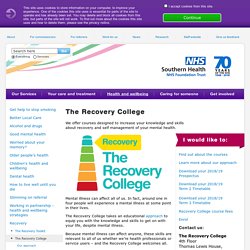
In fact, around one in four people will experience a mental illness at some point in their lives. The Recovery College takes an educational approach to equip you with the knowledge and skills to get on with your life, despite mental illness. Because mental illness can affect anyone, these skills are relevant to all of us whether we’re health professionals or service users – and the Recovery College welcomes all. If you’re a mental health professional, the courses on offer at the college are especially relevant, and we would encourage all staff working in mental health to enrol with the college.
Community Led Local Development in Leeds. YOUTH MHFA Two Day only Feb 2019. Experiments in Sociology - Revision Notes ~ ReviseSociologyReviseSociology. Your vision on how you will grow. Final lcc 1617 equality information report.
Research and Develop a Topic – Applied Digital Skills from Google. Colleges urged to set ambitious targets for access to HE. Colleges and universities should set “ambitious targets” in pursuit of equal opportunities when it comes to access to higher education, according to the Office for Students' director for fair access and participation.

In a speech later today at the launch of the Fair Education Alliance’s research into the use of contextual data in admissions, Chris Millward will say: “We are a long way from equality of opportunity in relation to access to higher education. So in the coming years, I will be expecting universities and colleges to set more ambitious targets in their access and participation plans to narrow the gaps.” This, Mr Millward will go on to say, would include measures to increase the pool of applicants with the high levels of attainment needed to enter many universities.
“But if we wait the years this will take to achieve, we will fail the next generation of students,” he will say. The Office for Students is the independent regulator for higher education in England.
Education needs diversity. As we face mounting teacher and leadership shortages, schools must attract talent from all sections of society.
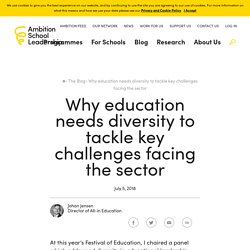
It’ll be increasingly difficult to do so if a school limits the way in which it approaches inclusion and how it fosters a working environment which values people’s differences and actively supports its staff to be themselves. Potential teaching and support staff will simply look elsewhere if the school, or wider education sector, isn’t supportive of who they are. In 2007 when I worked at Stonewall, I carried out research on over 1,000 young lesbian, gay and bisexual people in schools. 65 percent told me they’d experienced homophobic bullying (Hunt and Jensen, 2007). In the 2017 follow-up polling, Stonewall found that 45% of young LGB people experience homophobic bullying. When I worked in the field of leadership development in schools, I saw very little focus on diversity and inclusion as elements of high performing leadership.
'From social capital to social mobility' by Matt Lent - Future First. Our CEO, Matt Lent, writes about the value of building meaningful social capital networks for students and how we are incorporating this concept into our work… Social capital The networks between people and the relationships of trust and reciprocity they develop.
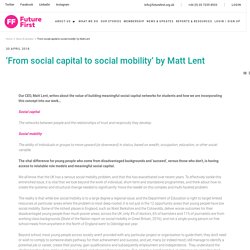
Social mobility The ability of individuals or groups to move upward (or downward) in status, based on wealth, occupation, education, or other social variable. The vital difference for young people who come from disadvantaged backgrounds and ‘succeed’, versus those who don’t, is having access to relatable role models and meaningful social capital. We all know that the UK has a serious social mobility problem, and that this has exacerbated over recent years.
Ten teaching techniques to practise – deliberately.
It’s a well-established idea that, to develop expertise in a particular skill or technique, you need to practise.
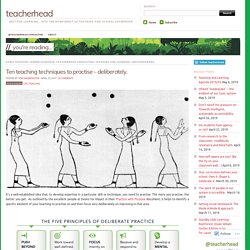
The more you practise, the better you get.
Teacher journal clubs: How do they work and can they increase evidence-based practice?
Knowing your subject: The role of disciplinary knowledge in effective teaching. Marking Crib Sheet – mrthorntonteach. Recently, I have been looking at our departments marking procedures and how best to be effective markers (obviously reducing workload is key!).

I designed this crib sheet as a way to provide quicker feedback to the whole classroom rather than writing comments in each book, so reducing marking time from 2-3 hours per class to less than an hour. Now I actually really do miss writing comments, leaving questions and the other bits in their books but it really wasn’t a workload issue I could continue with (especially as I have my first child on the way!). Therefore the crib sheet allows me to go through each students’ book and I make comments on the whole class sheet using the sections below.
The benefits are that it gives me a snapshot of the whole class’s progress, allows me to ‘fine tune’ my lesson planning and it also gives activities and tasks for students to complete within DIRT the next lesson. Pupils books look something like this – we do this every 2 weeks or so.
Guiding student improvement without individual feedback. Calling time on ineffective revision. 24 February 2018 Author: Dr Caroline Creaby, Sandringham Research School Director This week, the Chartered College of Teaching publishes the next volume of Impact, its termly peer reviewed journal.
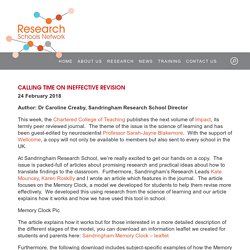
The theme of the issue is the science of learning and has been guest-edited by neuroscientist Professor Sarah-Jayne Blakemore.
Four things we learnt about the science of learning. The Learning Scientists.







